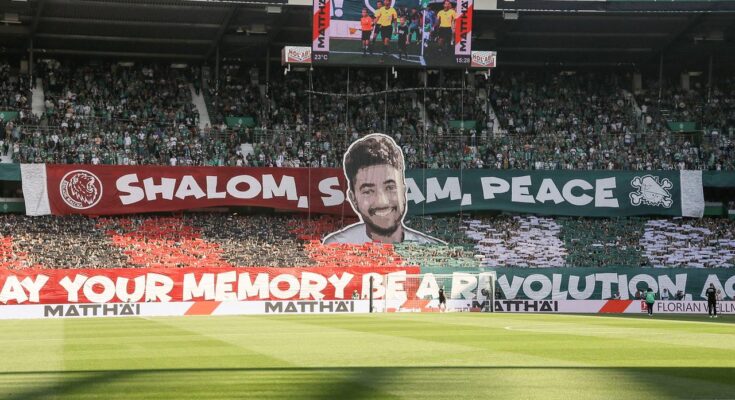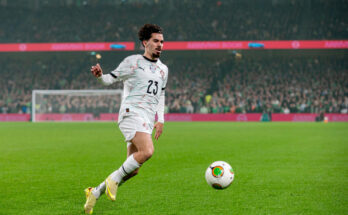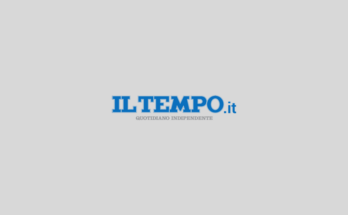What happens when Jewish identity meets German football culture?
Source: Imago
Football is a passion, a community – and a reflection of society. But for many Jews, it is also a place of tension: between belonging and exclusion, between solidarity and hostility.
With “Jews on the Pitch, Jews in the Stand,” Ruben Gerczikow and Monty Ott present an anthology that shows how much Jewish life is in football – and how much conflict there is at the same time.
ZDFheute: In your book, you talk about the tension between Jewish identity and being part of the fan world. How does this manifest specifically?
Ruben Gerczikov: There is bound to be conflict. In fan scenes where far-right or right-wing extremist groups are active, openly displaying Jewish identity can quickly lead to hostility or even threats.
We have experienced a significant increase in anti-Semitic incidents over the years, even before October 7th. Football is a magnifying glass: what exists in society is also reflected there. Anti-Semitic attitudes continue to be part of some fan groups. There are always examples – for example at clubs like Hansa Rostock or Energie Cottbus – that attract attention with right-wing extremist or anti-Semitic phrases and symbols.
Anti-Semitic crimes have increased significantly in Germany since the Hamas terrorist attacks. This is also caused by “uncontrolled immigration,” said Alon Meyer, head of Makkabi.
12/18/2024 | 3:51 min
ZDFheute: What forms of anti-Semitism do you see in stadiums and in the stands today?
Gerczikov: You have to differentiate between professional and amateur football. In the professional sector, anti-Semitism often manifests itself in the form of right-wing extremist expressions or so-called secondary anti-Semitism – that is, in the form of a defense of memory.
When the commemorative games take place, you often hear jeers from people who oppose the memory of the victims of National Socialism.
The word ‘Jew’ continues to be used as a swear word, and anti-Semitism regarding Israel also occurs in many places.
Ruben Gerczikow, writer
An example of this is the Conference League match between Union Berlin and Maccabi Haifa in October 2021, where Israeli fans were insulted with anti-Semitic insults and a Union supporter tried to burn an Israeli flag.
One year after October 7th
:Collective memory in a fan curve
A year ago, on October 7 2023, Hamas invaded Israel. Bundesliga clubs played an important role in the commemoration. But their commitment was also met with incomprehension.
by Ronny Blaschke
Israel-related anti-Semitism is very prevalent in the amateur sector – especially among the Maccabi clubs that take part in the national league. These clubs represent diversity but are often seen as representing Israel, especially in matches against teams whose players have Turkish or Arab migration backgrounds. Then the Middle East conflict came to the fore.
As a result, security measures had to be tightened after October 7 and police presence at Maccabi team matches had to be significantly increased.
Ruben Gerczikow, writer
… is a writer and journalist. He researches anti-Semitic structures in analog and digital spaces. His publications address the topics of anti-Semitism, right-wing extremism, Islamism, and the Jewish present. In September 2025, his second joint work with Monty Ott, the anthology “Jews on the Squares, Jews on the Stand,” was published.
Source: ZDF
ZDFheute: What responsibilities do football clubs have in their commitment to a culture of remembrance and in addressing anti-Semitism?
Gerczikov: Football has a huge social reach. Millions of people watch the games every weekend. This charisma can be used to reach and move people.
Almost every club has a Jewish history: players or officials who were persecuted under National Socialism. Such biographies allow for low levels of identification – especially for young people. History is not told in the abstract, but uses real examples from their daily lives: at their own clubs, in their own cities, at their famous stadiums.
This closeness helps understand where exclusion and anti-Semitism lead.
Ruben Gerczikow, writer
In recent years, clubs, fans and fan projects have taken this task more seriously. Many powerful projects are emerging: fan visits to memorial sites such as Sachsenhausen or Dachau, workshops and collaborations between clubs and NGOs.
According to police, from January to October 2024 the number of anti-Semitic crimes will double compared to the same period last year. Makkabi Frankfurt was also affected.
12/18/2024 | 1:01 min
ZDFheute: What impact will October 7 have on international football culture?
Gerczikov: October 7th has a big impact on football. On the one hand, the security situation of Makkabi clubs in Germany has become much worse. This also applies to Israeli clubs and their fans, who were already affected by anti-Semitism before October 7.
But the scale after October 7 was huge. Political conflicts are often considered football conflicts. In Amsterdam, for example, there was an anti-Semitic manhunt carried out in a chat group against Maccabi Tel Aviv fans.
In England we saw the city of Birmingham collectively deny entry to visiting Israeli fans at a match against Maccabi Tel Aviv.
There have been anti-Israel protests in many stadiums outside Germany, mainly from left-wing support groups.
Ruben Gerczikow, writer
Since Hamas’ attack on Israel on October 7, 2023, the number of anti-Semitic crimes in Germany has doubled. How did Holocaust survivors deal with this?
01/23/2025 | 43:30 min
ZDFheute: How did the fans in Germany react?
Gerczikov: In Germany the reaction was different. Many fan scenes, from the Bundesliga to amateur level, showed solidarity with the Israeli hostages and took a clear stand against anti-Semitism.
The Werder Bremen fan scene is particularly important: in memory of their friendship with Hapoel Jerusalem and Maccabi Haifa, fans repeatedly remember Hersh Goldberg-Polin and Inbar Haiman, who were killed while being held hostage by Hamas. Hersh’s murder deeply affected many people in the world of football.
It is noteworthy that even rival fan groups or those deemed apolitical, who have no connection to Werder Bremen, commemorated him.
Ruben Gerczikow, journalist
The interview was conducted by ZDFheute editor Ninve Ermagan.



